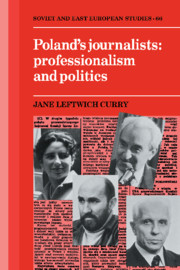Book contents
- Frontmatter
- Contents
- Acknowledgments
- 1 Journalists as professionals in theory and reality
- 2 The postwar roots of the profession
- 3 Living and learning journalism
- 4 Professional associations and professional politics
- 5 Journalists as political actors
- 6 Solidarity and beyond: the critical test of professionals and professionality
- Appendix: Research methodology: unwritten answers
- Notes
- Select bibliography
- Index
- Soviet and East European Studies
1 - Journalists as professionals in theory and reality
Published online by Cambridge University Press: 30 September 2009
- Frontmatter
- Contents
- Acknowledgments
- 1 Journalists as professionals in theory and reality
- 2 The postwar roots of the profession
- 3 Living and learning journalism
- 4 Professional associations and professional politics
- 5 Journalists as political actors
- 6 Solidarity and beyond: the critical test of professionals and professionality
- Appendix: Research methodology: unwritten answers
- Notes
- Select bibliography
- Index
- Soviet and East European Studies
Summary
Propaganda, a program of creating opinion, should serve the state as well as political, social and union organizations. But, the journalist should not feel he is a worker for the propaganda apparatus. Naturally, in the process of gathering information, the journalist will represent some point of view but this should be his point of view spoken in his name.
Stefan Bratkowski, Chairman, Polish Journalists Association, 1980–81Who speaks here? One of the “mouthpieces” of communist rule, carefully schooled in the rules and rhetoric of communism so that he could lead the population? Yes, but these are also the words of a professional journalist committed to his rights as a professional to work without interference for his own professional goals of service to the society and to professional leadership. Bratkowski's words were spoken, after the victory of Solidarity, as Polish journalists moved to reclaim their professional rights. The words are those of both a consummate professional and a committed political actor.
Although Bratkowski was a leader in the profession, he was hardly unique. He, like his colleagues, is a product of explicitly political indoctrination. Yet, his message was a call to try to improve the system not merely to serve the Party. In his case, like that of many of his colleagues, he had strived for some thirty years to make his work his own rather than merely to shape it to fit Party doctrines and censors' regulations.
- Type
- Chapter
- Information
- Poland's JournalistsProfessionalism and Politics, pp. 1 - 34Publisher: Cambridge University PressPrint publication year: 1990

